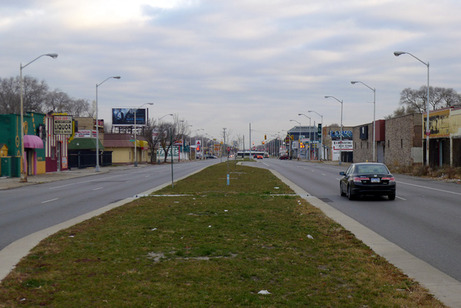-
today's events
Gallery and Bookshop Hours Chicago Architecture Biennial Jan 01, 2026 - Feb 28, 2026
-
upcoming event
-
past events
End-of-year Bookshop Sale Dec 13, 2025 - Dec 20, 2025
Eve Aboulkheir Lampo Performance Series Dec 06, 2025 Performance
Leila Bordreuil and Lee Ranaldo Lampo Performance Series Nov 08, 2025
Roc Jiménez de Cisneros Lampo Performance Series Oct 11, 2025
Concepción Huerta Lampo Performance Series Sep 27, 2025 Performance
Madlener House
4 West Burton Place
Chicago, Illinois 60610
Telephone: 312.787.4071
info@grahamfoundation.org

Livernois Corridor - Detroit's Next Hot Spot?
The nature of community development has evolved beyond the creation of long-term plans. Please join us as Monica Chadha and Virginia Stanard discuss how they create catalysts for communities through immediate actions and multidisciplinary partnerships in their work at Impact Detroit and in other neighborhood initiatives. Following the talk, Where If Not Us exhibition participant Michael Rios will start a brief discussion.
Monica Chadha is an architect and an Adjunct Assistant Professor at Illinois Institute of Technology. Her practice addresses community revitalization. In 2009, Chadha co-founded Converge:Exchange and she is currently developing Impact Detroit:, a partnership with the Detroit Collaborative Design Center (University of Detroit Mercy). Chadha was previously a Project Manager at Studio Gang Architects and Ross Barney Architects. At IIT, Chadha has led a community engagement design studio focused on the redevelopment of Bronzeville (Chicago) and several core studios. She has presented at several conferences and has most recently been published in Reveal, Princeton Architectural Press 2010. Chadha received her Masters of Architecture degree from the University of Illinois at Chicago, and a Bachelor of Environmental Studies in Architecture from the University of Waterloo, Canada.
Virginia Stanard is the Director of Urban Design at the Detroit Collaborative Design Center and Co-Director of the Master of Community Development program at the University of Detroit Mercy. She holds master’s degrees in Architecture and Urban Design from the University of Michigan and a bachelor’s degree in Architecture from the University of Virginia. Through practice and teaching, she advocates community development through the collaborative design process. At the DCDC, Virginia has developed economic and physical revitalization strategies at a range of scales and for a range of clients - including cities, philanthropic foundations, neighborhood groups, and developers. Recent projects include a greenway and development plan for daylighting the Bloody Run Creek on Detroit’s east side. Other projects include a development plan for Detroit’s Paradise Valley Cultural District, planning for Detroit Future City (formerly the Detroit Works Project Long Term Planning initiative), and revitalization strategies for Detroit’s 48217 and Woodbridge neighborhoods.
Impact Detroit, an initiative of the Detroit Collaborative Design Center (DCDC) at the University of Detroit Mercy School of Architecture, was launched in 2011 to support Detroit’s capacity for community development. It is an initiative that provides expertise, knowledge, and resources to help implement community-driven strategies as they relate to the built environment. Impact Detroit will form a collective hub leveraging the interdisciplinary expertise of professionals, local organizations, emerging leaders and community stakeholders to foster collaboration and realize local projects.
Converge: Exchange is a platform for communities, activists and practitioners to share innovative design strategies in local economies and for the built environment.
Michael Rios is an associate professor in the Department of Environmental Design and Chair of the Community Development Graduate Group at UC Davis. Formerly, Rios was the director of the Hamer Center for Community Design and the president of the Association of Community Design. Projects visited include: Organizing Public Interest Design, 1997-1999, revisited 2010 (Union Point Park, Oakland); A Public Transport Hub Becomes a Zócalo for Multiple Publics, 1995-1998, revisited 2010(Plaza del Colibri, San Francisco).
For more information on the exhibition, Where If Not Us? Participatory Design and Its Radical Approaches, click here.
Copyright © 2008–2026 Graham Foundation. All rights reserved.